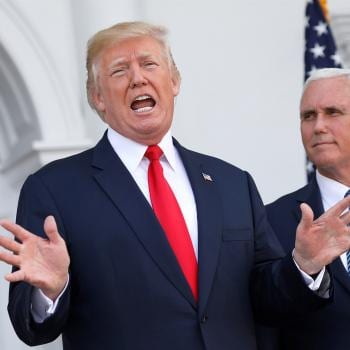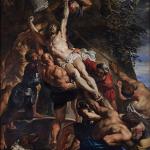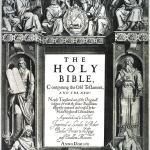 Author’s note: I don’t usually use this blog to write about political issues, but since my Saturday post about the RFRA got so many shares I decided to devote one more column to this subject.
Author’s note: I don’t usually use this blog to write about political issues, but since my Saturday post about the RFRA got so many shares I decided to devote one more column to this subject.
The controversy in Indiana has me thinking about the intersection of politics and religion. I’ve read a lot of online articles – and the reader the comments. Many exasperated commenters seem to be longing for a society free of religious influence. A common refrain: “Stop imposing your religion on me.” Or, “Get religion out of politics!”
But the commenters never say how these things might be achieved. How exactly can faith be divorced from politics, given the fact that more than 80% of U.S. citizens claim to practice a religion? The primary way Christians “impose” their views on others is by voting.
As long as people are religious, religious people will influence politics. They’ll do it the way everyone else does: by organizing, by campaigning, and by selecting candidates who reflect their values.
As I see it, there are only three ways to truly insulate the government from religious influence, short of making religion illegal (which ain’t gonna happen – at least not in my lifetime). If you want religion out of politics and public life, one of three things is going to have to happen:
1. Deny religious people the right to vote. Inevitably, people of faith bring their religious viewpoints into the voting booth. They select candidates based on religious criteria. As long believers vote, beliefs will influence politics.
But a purely secular electorate would quickly achieve complete separation of church and state. A law nullifying the votes of religious Americans would be a first step. Allow believers the dignity of voting, but leave their ballots uncounted.
Geolocation technologies would make this a snap. We can already track people with their smartphones. Officials can use software to ignore the votes of anyone who regularly attends a worship service.
This law would face a slew of court challenges, but could possibly be defended under the establishment clause of the First Amendment. A lawyer could plausibly argue that religious people vote according to their faith, which leads to an impermissible interference of church with state.
I know — it seems like a stretch. It might be easier to:
2. Deny religious people the right to hold public office. A more direct way to diminish the influence of religion is to bar religious candidates.
Congress is full of religious men and women (mainly Christians) The United States Congress has 535 members, and not one of them claims to be an atheist. State legislatures are even more religious. The Supreme Court is comprised of six Catholics and three Jews. Every President of the United States has been a self-proclaimed Christian.
But if people of faith were barred from holding office, religion’s grip on politics would be greatly weakened.
Constitutionally, this is a heavier lift. Article VI of the United States Constitution says:
… no religious test shall ever be required as a qualification to any office or public trust under the United States.
Secularists could argue (correctly) that the founders meant to prohibit officeholders from having to conform to a particular religion. The opposite – requiring a politician to be non-religious is not a religious test, since there’s no requirement that the candidate hew to a state-chosen faith.
Again, these laws would be tough to defend in court. But there’s one other way to completely separate church from state, while still allowing a form of religious freedom:
3. Update the First Amendment to protect belief but not exercise. In its current form, the First Amendment to the United States Constitution begins:
Congress shall make no law respecting an establishment of religion, or prohibiting the free exercise thereof
A change of two words would go a long way toward limiting the influence of religion in politics and public life:
Congress shall make no law respecting an establishment of religion, or prohibiting the free belief therein
This slight revision would still allow people freedom to believe as they choose, but would give legislatures the power to curtail religious practice.
This would be Bill Maher’s vision of paradise. No more pushy street preachers. No greedy televangelists. No little churches on every corner with their obnoxious signs. And no conservatives prattling on about the rights of the unborn.
And no more religious discrimination – period. No more cake controversies. No more abortion clinic protests.
The government could nullify any law that was seen as serving a religious purpose. That process began under Madalyn Murray O’Hair and continues today.
Of course, all three of these changes would be extremely difficult, given how religious our society remains. But there’s hope for ardent secularists. The number of Americans who subscribe to no religion has doubled in the past 50 years. And fewer than half of Americans actually practice their faith on a regular basis. As Christians continue to line up on “the wrong side of history” the nominally religious may ally themselves with secularists to make this vision a reality.
All it takes is the right federal judge.
In the meantime, we can look to the one society on earth that has successfully eliminated religion from politics and public life. This nation enjoys 100% separation of church and state. Not one of its leaders is openly religious. Its citizens enjoy complete freedom to believe what they want – while the public practice of religion is strictly prohibited. As a bonus, this country enjoys complete economic and gender equality – at least in theory.
Want to live in a society that has completely eliminated religion from the public square? It’s called North Korea.
 David Murrow is the author of the bestselling book, Why Men Hate Going to Church. David’s books have sold more than 175,000 copies in 12 languages. He speaks to groups around the world about Christianity’s persistent gender gap. He lives in Alaska with his wife of more than 30 years, professional silk artist Gina Murrow. Learn more about David at his Web site, www.churchformen.com, or join the conversation on his Facebook page, www.facebook.com/churchformen. Don’t forget to share this page by clicking on the links below, or scroll down and leave a comment (right below those annoying ads that pay for this blog).
David Murrow is the author of the bestselling book, Why Men Hate Going to Church. David’s books have sold more than 175,000 copies in 12 languages. He speaks to groups around the world about Christianity’s persistent gender gap. He lives in Alaska with his wife of more than 30 years, professional silk artist Gina Murrow. Learn more about David at his Web site, www.churchformen.com, or join the conversation on his Facebook page, www.facebook.com/churchformen. Don’t forget to share this page by clicking on the links below, or scroll down and leave a comment (right below those annoying ads that pay for this blog).
















